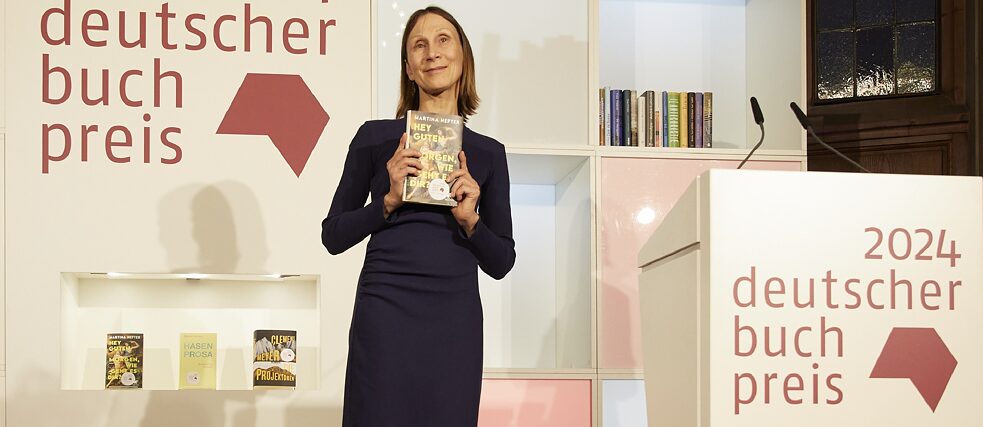German Book Prize 2024
Wolves, Winnetou and internet scammers

On October 14, 2024, the Frankfurt Römer, the historic city hall in Frankfurt am Main, hosted its annual grand literary celebration. The Deutscher Buchpreis, or German Book Prize—one of the most prestigious awards for authors writing in German—was presented there for the twentieth time. The winning book was Hey guten Morgen, wie geht es dir? (Hey, Good Morning, How Are You?) by Martina Hefter. But who else joined her on the shortlist of the year’s most notable literary achievements from German-speaking countries?
By Tomáš Moravec
Hey, Good Morning
Let’s start with the winner: Martina Hefter (born 1965 in Pfronten, Bavaria) is an established writer, poet, and performer. Her works often blend text with themes of dance and movement. However, despite these elements, her latest book does not exactly inspire a feeling of wanting to dance—though it’s not a pessimistic work either.Hey, Good Morning, How Are You? tells the story of Juno, a middle-aged woman who enjoys chatting with online scammers—men who, using fake identities and fabricated stories, try to emotionally manipulate lonely women and swindle them out of money. Juno knows exactly who she is dealing with. The scammers lie to her, and she lies right back. It’s a toxic game, allowing Juno to escape the grim reality of her daily life. She’s not looking for a prince charming; instead, she lies to those who deceive her as a way to inject some excitement into her life. But ultimately, isn’t it true that people who lie to others are often lying to themselves as well?
In awarding Hefter the prize, the German Book Prize jury praised her novel for its “clever construction” and its unique blend of the struggles of daily life with mythological figures and cosmic themes. The book shifts between melancholy and euphoria, exploring themes of trust and deception in a captivating way. Interestingly, Martina Hefter shares a lot in common with her protagonist Juno: they are the same age, both live in Leipzig with disabled husbands, and even share the same tattoo on their right forearms (a wild bee). Whether Hefter herself has ever engaged with online scammers was left unanswered at the award ceremony.
Seventy-four genocides
A strong contender for the prize was a book simply titled Vierundsiebzig (The Seventy-Four). It focuses on the genocide of the Yezidis—or, more accurately, genocides. So far, seventy four have been documented, with the most recent in 2014 inspiring the young author Ronya Othmann (born 1993 in Munich) to author a book that is not only a literary achievement, but also a valuable contribution to understanding the Yezidi community.Othmann writes from a place of deep understanding: she is of German-Kurdish (Yezidi) descent and spent part of her childhood in a Yezidi village in northern Syria, which no longer exists. Her book goes beyond a personal narrative. It’s not just a literary exploration, nor is it merely a detailed account of the centuries of persecution faced by the Yezidis. Central to the story is a crucial question: how can we portray the horrors of the world through fiction in a way that respects the victims, without exploiting their suffering?
In some ways, this question was already addressed back in 1933 by Franz Werfel in his classic novel The Forty Days of Musa Dagh, which dealt with the Armenian genocide. Whether Ronya Othmann's The Seventy-Four will be compared to that work, and whether it will stand up to such comparisons, is something that readers and critics—both now and in the future—will have to decide.
Wolves of the moor
A standout novel, rightfully shortlisted for the 2024 German Book Prize, comes from Ludwigsburg native Markus Thielemann (born 1992). His Von Norden rollt ein Donner (A Thunder Rolling In From The North), set in 2014, has been described by critics as an "anti-Heimat novel"—a sort of anti-patriotic story.The protagonist, 19-year-old Jannes, a shepherd from the Lüneburg Heath, uncovers the darker aspects of his country's and family's past: generational conflicts and unaddressed traumas, from 19th-century nationalist ideologies to mental illness within his own family. This deeply personal story is set against the backdrop of a timely and controversial issue: the return of wolves to the Lüneburg Heath.
"Markus Thielemann has crafted a richly atmospheric and linguistically powerful anti-nostalgic novel, where the archaic meets the modern, and the ghosts of the past haunt the seemingly idyllic Lüneburg Heath," the jury noted during the final nominations. Though it didn’t take home the top prize, it’s certainly not the last we’ll hear from Thielemann. A graduate of philosophy and geography at the University of Osnabrück, he first gained attention in 2021 with his debut novel Zwischen den Kiefern (Among the Pines), which also tackled the clash between nature, humanity, and morality—an ever-relevant theme.
Winnetou at the Clinic
One of the most prominent names to make the final six was Clemens Meyer. The renowned Leipzig author—best known for his debut novel Als wir träumten (As We Were Dreaming)—has collected many awards over the past twenty five years, but the top honour has eluded him so far, despite making the shortlist for the German Book Prize twice. The first time was in 2006 with his debut novel, and the second time is this year with Die Projektoren (The Projectionists).Meyer kept his readers waiting for eleven long years for a new novel, and now he is sure to make up for it—not only due to the undeniable literary quality of the book, but also thanks to the support of his publisher, S. Fischer. The publishing house has clearly put its commercial faith in him, and as a result, Die Projektoren can be found in stacks across German bookstores, from Dresden and Frankfurt to Limburg an der Lahn and Stuttgart.
Once again, Meyer looks to the past, exploring themes of war, conflict, and violence. He takes readers through Leipzig and Belgrade, weaving in stories of GDR comrades and Yugoslav partisans. At the heart of it all is a surprising cultural reference: the fictional Apache, Winnetou. "Germans in Yugoslavia, Karl May, international film productions, and the crumbling dream of Yugoslavia. This is great cinema; this is great literature. That's something for me," Meyer passionately says about his inspiration.
And he was right. "Die Projektoren is a novel that fully engages its readers, while deliberately overloading and overwhelming them with a wealth of material," the jury noted. "Meyer discusses the Yugoslav wars of the 1990s, the Second World War, Karl May's films, and cinema as a whole. His connections are remarkable, his characters are always in motion, just like the stories he tells—whether they are about war, cinema, or love," the jury concluded, calling it "a literary event."
Clearings from Romania
Iris Wolff (born 1977 in Sibiu, Romania) transports her readers to the landscapes of her native Eastern Europe. A standout voice among the younger generation of German-language authors with roots beyond modern Germany, Wolff first gained widespread attention in 2020 with her novel Die Unschärfe der Welt (Blurred). This moving story follows a family from the Banat region whose bonds remain unbroken, even across borders. Wolff returns to Banat in her latest award-winning book, Lichtungen (Clearings).Lichtungen tells the tale of an extraordinary friendship that begins in childhood and lasts for decades. Wolff takes her readers on a journey from socialist Romania in the 1980s to capitalist Switzerland, a path marked by the clash of worlds, political regimes, and universal values—along with the profound shift from childhood to adulthood. The coming-of-age and love story is told with "great sensitivity and subtlety," highlighting the pivotal moments in the characters' lives. Wolff anchors her characters in specific, evocative landscapes, bringing their inner and outer worlds to life with precision and depth.
And Finally—A Hare
The six finalists for the German Book Prize close on a somewhat unusual note—featuring a hare. This animal plays a central role in Hasenprosa (Hare Prose), the latest work by German author Maren Kames (born 1984 in Überlingen, Baden-Württemberg). Kames made her literary debut in 2016 with Halb Taube Halb Pfau (Half Pigeon, Half Peacock), which immediately earned her numerous awards and scholarships. Her second book, Luna Luna (2019), led to a nomination for the 2020 Leipzig Book Fair Award. Both of her previous works have been adapted into radio plays.Her new novel, Hasenprosa, draws parallels to Alice in Wonderland, as the jury noted. Like Alice, the protagonist here is guided by a cunning hare (though Alice had a rabbit, not a hare—but no matter). For Kames, the hare symbolizes the many moods, emotions, and temperaments we encounter on our life journey. She deliberately avoids realism, stating "For in realism, fantasy gets lost."
So what is Hasenprosa actually about? At its core, it's about family—grandfather, grandmothers, brother—but told in an experimental, non-linear fashion. Instead of a traditional plot, the book offers a mosaic of thoughts, inner monologues, and images that loosely connect to themes like loneliness, identity, nature, and the body’s relationship with the world. The text is often surreal, playful, and filled with absurd situations and unexpected combinations. There’s no doubt about its literary brilliance either: "The virtuoso use of wordplay, the rich imagery, the sparkling linguistic wit, and the laconic, full-blooded turns of phrase," as the jury described it.
On October 14, 2024, Martina Hefter became the 20th recipient of the German Book Prize, joining previous winners like Tonio Schachinger (2023), Kim de l'Horizon (2022), and Antje Ravik Strubel (2021). The jury that will select the longlist, shortlist, and ultimately the winner for 2025 will be announced in February.

German Book Prize: Shortlist 2024 | © Christof Jakob
Comments
Comment